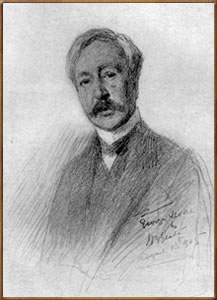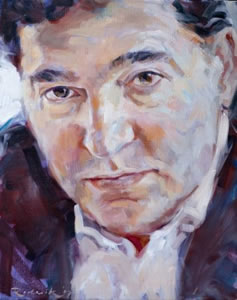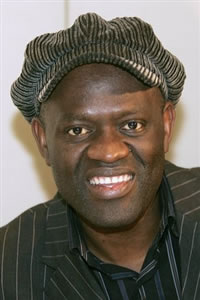De Poolse schrijver, filosoof, fotograaf en schilder Stanisław Witkiewicz werd geboren in Warschau op 24 februari 1885. Zie ook alle tags voor Stanisław Witkiewicz op dit blog.
Uit: Narcotics (Vertaald door Soren A. Gauger)
“Given that my ‘free-form creativity” has amounted to no more than ‘whistling Dixie” I realized my writing experiments were of no use to the nation and society, and thus I have decided to share my views on narcotics with the general public. I begin with the most commonplace — tobacco — and conclude with perhaps the most bizarre — peyote (for which I reserve a special place). MS is my modest contribution to help the forces of good battle humanity’s most diabolical foes, outside of war, poverty, and disease. As the intent of this work is to lay bare bitter truths, it might end up being received in the same humorous or negative vein as my aesthetics, philos-ophy, works for the stage, essential portraits, old compositions, etc. — a “free-form produce’ I hereby declare that I am writing in total seriousness, and that I finally seek to produce something useful. Yet there is no way of getting through to idiots and lowlifes, as I have learned over the course of my dreary career. It’s utterly futile to tell someone, ‘You’re stupid, go learn a thing or two, maybe you’ll wise up,” because a stupid man is also an arrogant man, so even if he could learn to wise up, it still wouldn’t break the vicious circle. It’s wasted breath to tell a scumbag: It’s not nice to be such a swine. Why don’t you smarten up, get your act together?’ We fail to comprehend that the majority of scumbags are consciously scummy — they are aware of it and would not wish to be any different, as long as they’re able to conceal their scumminess. `Can youfolgive a stick for being a stidcr wondered Tadeusz Szymberski — and he had a point. I was once alighting man par excellence: I had my ideas and wanted to fight for them, but there was no one around to fight.”

Stanisław Witkiewicz (24 februari 1885 – 18 september 1939)
Zelfportret 1902
De Amerikaanse schrijver en uitgever August William Derleth werd geboren op 24 februari 1909 in Sauk City, Wisconsin. Zie ook alle tags voor August Derleth op dit blog.
Uit: Walden West
“The house of childhood is long gone from the street where it stood in Sac Prairie, but it still stands in memory—a little, one-story ground-hugging house, set close to the lane that passed by west of it in lieu of sidewalk which was to come later, sheltered by huge, century-old soft maples and some younger red cedars and hackberry trees, a little house of white-painted siding, and too few windows, its front door opening abruptly from its south wall, and its back door to the east, on to a snug little verandah, walled in to the south by a bedroom ell, and on the north by a short wooden fence running along the raised wooden sidewalk to the summer-kitchen, which shut off the north winds in winter, and which summered us from spring to late autumn—a place to eat and bathe away from the main house. On this porch the sunlight pooled warmly on the coldest winter day, and from it ran, a little way east and then north among grape arbors, a wooden walk that led still farther north across the garden to the home of my Grandmother Volk and my Great-uncle Philip, my Grandfather Volles brother, whom she had married a quarter of a century after my Grand-father Volk had died, and who was, on my mother’s side, the only grandfather I knew.
It was a snug, cozy house, in the shape of a compact L, standing with its base to the south, with a little kitchen at the north end, then a small dining-room, then a somewhat larger “front” room—in those days, in Sac Prairie, the sitting-room or parlor was always called the “front” room—dominated by a large coal stove, red with heat in winter, off which opened the bedroom which my sister and I shared with our parents. The house had a piano in it—some-times along the west wall of the dining-room, sometimes along the north wall of the front room. All the openings to the rooms were at their northeast corners, so that a kind of passageway seemed to run along the east wall of the house to that point at which the front door opened out into the spacious lawn, where, under one of the old maples, sat a lawn swing, and, at that same point to the left, the door opened into our common bedroom. A huge clump of bridalwreath stood at the northwest corner of the house, where its fragrance poured into the kitchen on spring days. East of the bedroom stood an old-fashioned pump, and south of it a sturdy black ash tree grew, and there beneath it our dog Fido had his house, from which he ran to the south through the lawn for half a block on a chain attached to a long wire, so that he commanded a wide range. Gardens stretched eastward and into the northwest, toward a woodshed, a henhouse and yard, and the two-holer from which we were afforded a leisurely view of the street and such passersby as ventured along it while any of us was occupied within.”

August Derleth (24 februari 1909 – 4 juli 1971)
Cover
De Duitse schrijfster en architekte Keto von Waberer werd geboren op 24 februari 1942 in Augsburg. Zie ook alle tags voor Keto von Waberer op dit blog.
Uit: Mingus
„Papa Tabletten. Das sind deine, da in der roten Schachtel. Da steht ›Mingus‹ drauf. Dein Name.« Ich will die Tabletten nicht. Ich will nicht schlafen. Jetzt aber werde ich schlafen. Papa ist tot. Ich höre das Windrad klappern hoch überm Haus. Da stehen seine Schuhe vor dem Bett. Ich schaue hinüber und versuche, seine nackten Füße zu sehen, dort, wo er liegt. Er ist nur ein dunkler Haufen.
Als es hell wird, schließe ich die Tür auf und stehe auf der Schwelle. Ich stehe da. Ich habe Lust gehabt, gleich loszulaufen, und es macht mich böse, dass er mich zurückhält, ganz so, als könnte er noch sprechen. Ich weiß, wo er die Spaten hat, drüben im verbotenen Haus aus Metall, in das ich noch nie hineindurfte. »Das ist gefährlich«, sagt Papa. »Das ist kein Ort für dich. Du würdest sofort sterben, sobald du auch nur die Tür berührtest. Verstehst du mich?« Ich weiß, was sterben ist. Ich habe gesehen, wie die Kleinen starben, hässliche magere Dinger, die schlecht rochen und mit offenen Mäulern schrien, nicht essen wollten, um sich schlugen und uns nachts nicht schlafen ließen. Sie wollten nicht sterben. Dann lagen sie still, und Papa brachte sie weg. Eingewickelt in ihre Schlafdecken. Er selbst hockt da und heult, als wäre er selber gestorben. »Was ist mit dir los?«, frage ich ihn. »Das sind deine Brüder!«, brüllt er, und als ich lache, schlägt er mich. »Du warst auch so klein«, flüstert er. »Du warst auch so klein.« Ich kann mich nicht daran erinnern. Ich war immer stark, und ich habe immer gerne gegessen. Mehr weiß ich nicht.
Am Morgen liegt Tau auf den Felsen, ich lecke daran. Ich laufe los, meine Schritte werden immer größer. Sie werden zu hohen Sprüngen. Noch einer, noch einer, weiter, höher, noch höher. Das ist schön. Ich brülle. Ich umrunde das Haus, das Windrad, und es trägt mich weiter bis zu den fernsten Felsen. Ich fliege. Sand hebt sich und streift meine Beine mit Nadelstichen. Ich mag Nadelstiche nicht, aber diese prickeln wunderbar. Ich renne, bis ich keine Luft mehr in mir habe. Ich lasse mich in den Sand fallen. »Brüll nicht so hässlich«, sagt Papa. »Hör auf«, sagt Papa. Ich gehe und trinke Wasser. Viel Wasser.“

Keto von Waberer (Augsburg, 24 februari 1942)
De Turkse dichter, schrijver en vertaler Yüksel Pazarkaya werd geboren op 24 februari 1940 in Izmir. Zie ook alle tags voor Yüksel Pazarkaya op dit blog.
Gedanken auf der Flucht
2
Meine gestauten Ängste kann ich hier nicht zurücklassen
Meine verbrauchten Hoffnungen
Auch sie will ich mitnehmen
Beschimpfungen gesammelt durch so viele Jahre
Beleidigende Blicke gehäuft zu einem Buckel
Schritte die ich gemacht
Die Kraft meiner Arme dahin auf Fließbändern
Die Jahre verflossen vor meinen Augen
Alles alles möchte ich mitnehmen
Dazu noch meine Träume gerade die Träume
Die Luftschlösser die ich baute
Und all meine Verbrauchtheit all meine Erschöpfung
Ich soll gehen na gut ich soll gehen von hier
Hier hinterlassen möchte ich jedoch
Nichts von mir

Yüksel Pazarkaya (Izmir, 24 februari 1940)
De Franstalige schrijfster Irène Némirovsky werd op 24 februari 1903 in Kiev geboren. Zie ook alle tags voor Irène Némirovsky op dit blog.
Uit: Suite française
« Où allait le monde ? Que serait l’esprit de demain ? Ou bien les gens ne penseraient plus qu’à manger et il n’y aurait plus de place pour l’art, ou bien un nouvel idéal ? Cynique et las, il pensa: “Une nouvelle mode !” Mais lui, Corte, était trop vieux pour s’adapter à des goûts nouveaux. Il avait déjà en 1920 renouvelé sa manière. Une troisième fois, ce serait impossible. Il s’essoufflait à le suivre, ce monde qui allait renaître. Ah ! qui pourrait prévoir la forme qu’il prendrait au sortir de cette dure matrice de la guerre de 1940, comme d’un moule d’airain, il allait sortir géant ou contrefait (ou les deux), cet univers dont on percevait les premiers soubresauts. C’était terrible de se pencher sur lui, de le regarder… et de ne rien y comprendre. Car il ne comprenait rien. Il pensa à son roman, à ce manuscrit sauvé du feu, des bombes, et qui reposait sur une chaise. Il éprouva un intense découragement. Les passions qu’il décrivait, ses états d’âme, ses scrupules, cette histoire d’une génération, la sienne, tout cela était vieux, inutile, périmé. Il dit avec désespoir: périmé !”

Irène Némirovsky (24 februari 1903 – 17 augustus 1942)
De Franse dichter en schrijver Vincent Voiture werd geboren op 24 februari 1598 in Amiens. Zie ook alle tags voor Vincent Voiture op dit blog.
Sous un habit de fleurs, la Nymphe que j’adore
Sous un habit de fleurs, la Nymphe que j’adore,
L’autre soir apparut si brillante en ces lieux,
Qu’à l’éclat de son teint et celui de ses yeux,
Tout le monde la prit pour la naissante Aurore.
La Terre, en la voyant, fit mille fleurs éclore,
L’air fut partout rempli de chants mélodieux,
Et les feux de la nuit pâlirent dans les Cieux,
Et crurent que le jour recommençait encore.
Le Soleil qui tombait dans le sein de Thétis,
Rallumant tout à coup ses rayons amortis,
Fit tourner ses chevaux pour aller après elle.
Et l’Empire des flots ne l’eût su retenir ;
Mais la regardant mieux, et la voyant si belle,
Il se cacha sous l’onde et n’osa revenir.

Vincent Voiture (24 februari 1598 – 26 mei 1648)
Cover
De Spaanse dichteres Rosalía de Castro werd geboren op 24 februari 1837 in Santiago de Compostela. Zie ook alle tags voor Rosalía de Castro op dit blog.
The Atmosphere Is Incandescent
The atmosphere is incandescent;
The fox explores an empty road;
Sick grow the waters
That sparkled in the clear arroyo,
Unfluttered stands the pine
Waiting for fickle winds to blow.
A majesty of silence
Overpowers the meadow;
Only the hum of an insect troubles
The spreading, dripping forest shadow,
Relentless and monotonous
As muffled rattle in a dying throat.
In such a summer the hour of midday
Could as well go
By the name of night, to struggle-weary
Man who has never known
Greater vexation from the vast cares
Of the soul, or from matter;s majestic force.
Would it were winter again! The nights! The cold!
O those old loves of ours so long ago!
Come back to make this fevered blood run fresh,
Bring back your sharp severities and snows
To these intolerable summer sorrows…
Sorrows!…While vine and corn stand thick and gold!
The cold, the heat; the autumn or the spring;
Where, where has delight set up its home?
Beautiful are all seasons to the man
Who shelters happiness within his soul;
But the deserted, orphaned spirit feels
No season smile upon its luckless door.
Vertaald door Edwin Morgan

Rosalía de Castro (24 februari 1837 – 15 juli 1885)
Cover
De Duitse schrijver Erich Pawlu werd geboren op 24 februari 1934 in Frankstadt, Mähren. Zie ook alle tags voor Erich Pawlu op dit blog.
Uit: Kurioser Brautschau-Irrtum (Bespreking)
„Für den reichen Herrn Morose ist jedes Geräusch wie ein Heavy-Metal-Konzert. Die Überempfindlichkeit des Gehörs erschwert seine Vermittlung am Heiratsmarkt. Deshalb lässt sich Morose ein scheinbar stilles Wesen andrehen. Aber nach der Hochzeit erweist sich das Geschöpf nicht nur als schrill,sondern auch als männlich. Erfunden hat die Geschichte um 1600 Ben Jonson, wobei er bei der Zusammenstellung der Zutaten den literarischen Diebstahl nicht scheute. Seitdem haben verschiedene Autoren das Gericht neu zubereitet. Stefan Zweig hat es Richard Strauß unter der Libretto-Bezeichnung „Die schweigsame Frau“ serviert. Ellis Kaut, die „Pumuckl“-Erfinderin, lieferte mit „Die Ohren des Herrn Morose“ nun dem Stadeltheater ein Rezept für ein exquisites sommerliches Menü. Denn Regisseur Leo Schmitt taucht die Handlung in den Lichterglanz eines heiteren Sommertags. Der komödiantische Ablauf der Ereignisse räumt dem Publikum viel Gelegenheit ein, sich im Dunkel des Parketts mit einigen dümmeren Menschen oben im Scheinwerferlicht zu beschäftigen. Die meisten Gestalten typisieren nämlich jene Formen menschlicher Verirrung, denen Psychiater und Komödiendichter ihre Einkünfte verdanken.“

Erich Pawlu (Frankstadt, 24 februari 1934)
Scene uit een opvoering van “Die schweigsame Frau” van Richard Strauss, München, 2014
Zie voor onderstaande schrijver ook mijn blog van 24 februari 2018 deel 2.
De Duitse dichter en schrijver Paul Alfred Kleinert werd geboren op 24 februari 1960 in Leipzig. Zie ook alle tags voor Paul Alfred Kleinert op dit blog.


















